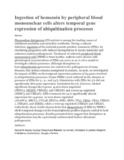| dc.description.abstract | Plasmodium falciparum (Pf) malaria is among the leading causes of childhood morbidity and mortality worldwide. During a natural infection, ingestion of the malarial parasite product, hemozoin (PfHz), by circulating phagocytic cells induces dysregulation in innate immunity and enhances malaria pathogenesis. Treatment of cultured peripheral blood mononuclear cells (PBMCs) from healthy, malaria-naïve donors with physiological concentrations of PfHz can serve as an in vitro model to investigate cellular processes. Although disruptions in host ubiquitination processes are central to the pathogenesis of many diseases, this system remains unexplored in malaria. As such, we investigated the impact of PfHz on the temporal expression patterns of 84 genes involved in ubiquitination processes. Donor PBMCs were cultured in the absence or presence of PfHz for 3-, 9-, and 24 h. Stimulation with PfHz for 3 h did not significantly alter gene expression. Incubation for 9 h, however, elicited significant changes for 6 genes: 4 were down-regulated (FBXO4, NEDD8, UBE2E3, and UBE2W) and 2 were up-regulated (HERC5 and UBE2J1). PfHz treatment for 24 h significantly altered expression for 14 genes: 12 were down-regulated (ANAPC11, BRCC3, CUL4B, FBXO4, MIB1, SKP2, TP53, UBA2, UBA3, UBE2G1, UBE2G2, and WWP1), while 2 were up-regulated (UBE2J1 and UBE2Z). Collectively, these results demonstrate that phagocytosis of PfHz by PBMCs elicits temporal changes in the transcriptional profiles of genes central to host ubiquitination processes. Results presented here suggest that disruptions in ubiquitination may be a previously undiscovered feature of malaria pathogenesis. | en_US |
| dc.subject | Ingestion, hemozoin, peripheral, blood, mononuclear, cells, alters, temporal, gene, expression , ubiquitination, processes | en_US |

